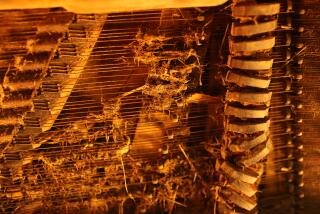Vladimir Horowitz: An Appreciation : Music: A legend who played by his own quirky, sometimes dubious rules, Horowitz made the trivial seem elegant, the significant ethereal.
Vladimir Horowitz, who died on Sunday one month after his 85th birthday, was--well--Vladimir Horowitz.
There was no other pianist like him. Chances are, there never will be.
He played by his own rules, even at his worst. At his best, he played magnificently. That puts it, as they say, mildly.
Once established and universally adulated, he played only when he pleased (in later years at the odd hour of 4 on Sunday afternoons). He played only where he pleased. He played only what he pleased. Legends can afford to be choosy.
No one played faster or slower, louder or softer, smoother or rougher than Horowitz. He respected no conventional limits.
No one played with such nonchalant virtuosity. No one played with such dazzling individuality. No one played with such uncanny accuracy. No one played with such abiding expressive allure.
Do not misunderstand. They still make great pianists--pianists who, like Horowitz, seem to command at least 40 fingers of flexible steel. However, they no longer make pianists with faces like Horowitz.
I am not referring, of course, to his actual physiognomy. His dapper hang-dog look exerted its undisputed appeal--the eyelids drooping soulfully, the mouth telegraphing charm in spite of itself, the noble, generous nose dominating everything else proudly. But Horowitz’s artistic profile was the crucial image.
It was a profile predicated on inspired egocentricity. Horowitz may not have been a deep thinker. More important, he was a deep dreamer. Inhibition was not his forte.
He made the commonplace seem elegant, and the significant seem ethereal. When drama was called for, he thundered until the heavens rattled. When introspection was deemed appropriate, he melted into sighs and whispers that lent new meaning to the concept of delicacy. Most important, perhaps, he understood that dynamic extremes can make little impact without the logical reference of a sane and poised middle ground.
At his best, he sustained superhuman control even under unreasonable duress. He was a poet--and a sentimentalist--who could make a soggy ditty like Schumann’s “Traumerei” sound like lofty poetry. He could make the sparklets of Moszkowski fly like exquisite missiles from another world.
He could almost make “The Stars and Stripes Forever!”--in his own bravura transcription, naturally--sound like music. He even could convince us that Bizet really intended the most seductive of Carmens to be not a mezzo-soprano vamp but a cheeky pianist.
No one played a Chopin nocturne as Horowitz did--with as many moonstruck colors, as sensuous a rubato and with as many subtle nuances. No one brought the same passion to Rachmaninoff (a personal friend), the same nobility to Beethoven, the same sensitivity to Schumann, or the same warmth to Brahms.
Like all giants, he had his detractors. They complained, with good reason, that Horowitz played Mozart as if that unfortunate composer had the bad taste to be born a century too early. They griped, reasonably, that Horowitz distorted the likes of Scarlatti and Clementi with Romantic anachronisms.
His critics lamented his disdain for modernism, although they had to note that he did introduce Samuel Barber’s Opus 26 Sonata to the world in 1949. They did document his abiding tendency toward superficiality, on occasion, for its own slick and shimmering sake.
Horowitz certainly wasn’t a scholar. He wasn’t a stylist in matters of authentic performance practice. A product of his time, he remained to the end a charter member of the I-play-it-this-way-because-I-feel-it-this-way club.
Some of his playing may have been eccentric or misguided or even wrongheaded. During periods of fragile or declining health, his playing suffered obvious technical lapses. But Horowitz was never boring.
Everyone knows the lore about his foibles. He commanded, and blithely received, astronomical fees. He insisted on traveling--even to Russia--with his own entourage of sycophants and engineers, his own food, and his own piano. Reliable sources insist that it was a carefully doctored instrument that helped manufacture the fabulous and possibly unnatural Horowitz tone.
He was a shrewd show-businessman. He made sure that every hemidemisemiquaver of his twilight years would be recorded for a grateful posterity on videotapes as well as recordings.
He struck poses of disarming modesty on the stage and, sometimes, in interviews. But--spurred ever onward by his stubbornly watchful wife, Wanda Toscanini--he could act like a tyrant or spoiled brat or both behind the scenes.
One never saw him at other artists’ concerts. On the other hand, he did enjoy outings at nightclubs or discos. According to longstanding rumors substantiated by his biographers, he enjoyed the company of doting boys as well as adoring women.
He seemed indomitable. Amid reports of a nervous disorder, he disappeared from public view for a long time in the 1960s, only to return in better form than ever before. He played one tour late in his career that seemed to document a tragic loss of prowess, then undertook another comeback that made happy liars of all the doomsayers.
He hobnobbed with the creme of society, even with royalty, and showed no outward signs of awe. According to John Pfeiffer, the long-suffering record producer, Prince Charles of Great Britain once visited the Horowitzes after a concert and invited the couple to Buckingham Palace for a drink.
“I don’t drink,” the pianist brashly apologized.
“Then we’ll make you some borscht,” the Prince countered.
“Ugh,” responded Horowitz, making a sour face.
Undaunted, the prince of pianists did visit the Prince of Wales and Lady Diana the next week. Noblesse obliged on several levels. But Horowitz pointedly declined any refreshments.
He always adhered to his standards.
More to Read
The biggest entertainment stories
Get our big stories about Hollywood, film, television, music, arts, culture and more right in your inbox as soon as they publish.
You may occasionally receive promotional content from the Los Angeles Times.










